Reasons for Google Rankings Drop: Understanding Why Your Site’s Ranking Dropped
Experiencing a Google ranking drop can be a frustrating experience for any website owner or online entrepreneur. It can separate your site from high-volume traffic and adversely impact your conversions and revenue. To regain your position on search result pages, it’s essential to understand why your Google rankings dropped and learn solutions for ranking drops.
There are multiple reasons why your site’s rankings may have dropped. We’ll discuss common issues that may lead to a Google rankings drop, and help you find ways to recover from these drops. Here are some of the prevalent reasons you may have experienced a Google rankings drop:
Google’s rankings can drop for numerous reasons. To identify the cause of a Google ranking drop, it’s vital to evaluate and analyze your site’s performance, content quality, and SEO implementation. Understanding the factors behind your site’s ranking dropped can provide insight into the necessary corrective actions to regain your position in SERPs. Additionally, keeping a keen eye on Google algorithm updates, strengthening your site’s SEO strategy, and regularly updating and creating unique content will reduce the chances of a future rankings drop. Don’t let a Google ranking drop get you down; instead, use it as an opportunity to learn, grow, and adapt your site’s SEO practices to stay ahead in the ever-evolving online marketing game.
1. Algorithm Changes: How Google’s Updates Can Impact Your Search Engine Rankings
If you’ve noticed a sudden drop in your site’s Google search engine rankings, it’s possible that recent algorithm changes have impacted your position. Google’s algorithm determines where websites rank in search results, and they constantly update their system to provide the most relevant and helpful content for users. When Google’s updates occur, some sites may experience a decrease in search engine visibility. Let’s dive into how Google’s algorithm changes can affect your site’s rankings and what you can do to address this issue.
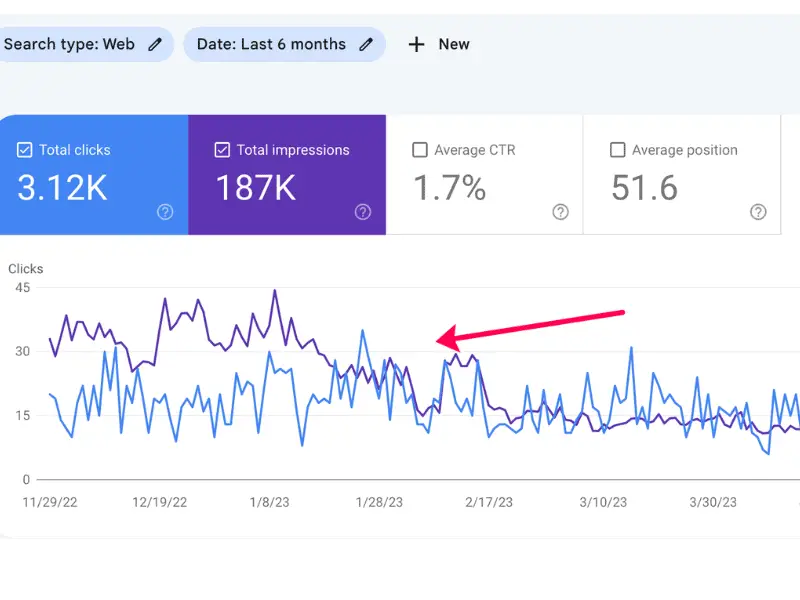
Google’s search engine algorithm uses hundreds of factors to rank websites, such as site speed, user experience, keyword usage, and much more. By keeping up with these requirements, you can maintain and improve your site’s rankings. However, Google’s algorithm changes now and then, causing fluctuations in search engine results. To stay informed about Google’s updates, check Moz’s handy directory of Google’s algorithm updates to see if there’s a new one at work.
In my recent blog post titled How to Tell If Your Site Is SEO Optimized for Search Engines? I delve into the complex world of search engine optimization (SEO) and provide valuable insights for website owners.
Some of Google’s algorithm updates target specific aspects of a site, such as content quality or mobile-friendliness. Google’s goal is to provide the best search engine experience for its users, and the algorithm changes contribute to that. If your site doesn’t meet Google’s new standards, it could negatively affect your search engine rankings. Therefore, when Google’s updates occur, it’s essential to learn what changes were made and how they may impact your site.
Google’s algorithm updates can also penalize any unethical techniques used by webmasters to boost their search engine rankings. Google’s algorithm is designed to promote high-quality, relevant information, and prevent spammy content from rising to the top. If your site is found to be using questionable tactics like keyword stuffing, cloaking, or duplicate content, Google’s updates may decrease your site’s search engine visibility.
Read about: What are the 4 important stages in SEO?
So, how can you ensure your website remains in the good graces of Google’s search engine algorithm? Follow these tips to stay on top of Google’s updates and avoid ranking drops:
- Always prioritize high-quality, unique content. Google’s main goal is to provide helpful, informative content for its users, so focusing on delivering value should help maintain your rankings.
- Stay informed about Google’s algorithm changes. Regularly check industry news and resources such as Moz’s directory to stay in the loop about Google’s updates.
- Optimize your site for mobile devices. As more people use their smartphones to access the internet, Google’s algorithm updates may continue to prioritize mobile-friendly websites.
- Improve your site’s overall user experience. Google’s algorithm takes several factors into account, such as site speed and ease of navigation, so make sure your website is loading quickly and is easy for visitors to use.
- Avoid using spammy or deceptive tactics. Google’s algorithm changes often focus on penalizing sites that try to cheat the system. Stick to ethical techniques to maintain your search engine rankings and avoid penalties.
If your site’s Google search engine rankings have dropped, don’t panic. Algorithm changes are a natural part of Google’s process to provide the best results for users. Stay informed, adapt your site to meet Google’s standards, and prioritize the delivery of valuable content to your audience. By doing so, you’re more likely to recover from ranking drops and maintain a strong search engine presence.
2. On-site Issues: Evaluating Your Website’s Content and Technical Aspects for Ranking Drops
When you’re trying to understand why your website’s rankings might have dropped, one important aspect to consider is possible on-site issues. These problems could be related to the content of your website, technical difficulties, or other factors affecting the overall performance and user experience of your site. To effectively assess any on-site issues and find solutions for ranking drops, it’s essential to evaluate various content and technical aspects of your website, as well as identify any recent changes made to the site that might have contributed to the decline in rankings.
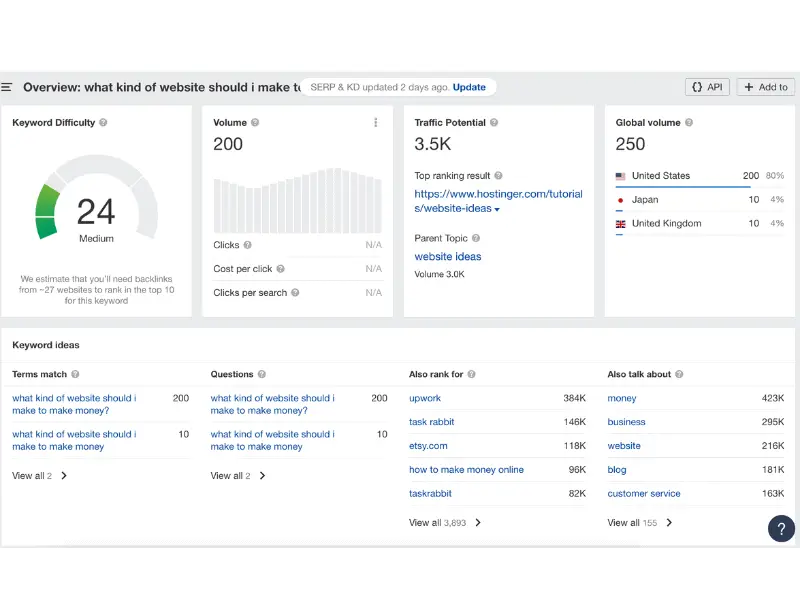
For instance, content changes can have a significant impact on your website’s search engine ranking, especially if modifications lower the overall quality or relevance of your content. Changes to your website’s content might include alterations in keyword usage, unrealistic keyword density, or even the complete removal of important, high-quality content. When reviewing any recent impact caused by these types of changes, it’s critical to examine the process through which your content is created, as well as the techniques and strategies utilized for optimizing that content. By doing so, you will be able to identify any potential issues with the content on your website, allowing for improvements to be made and your rankings to recover.
In addition to content changes, there may be technical issues with your website that affect its ranking. These issues can range from broken links and navigational errors to slow load times or security vulnerabilities. If visitors experience difficulty accessing or navigating your website, or if they encounter various issues while using your site, it can contribute to a decline in your website’s rankings. It is crucial to conduct regular audits and address any technical problems that are discovered to ensure that your website remains accessible, user-friendly, and optimized for search engine rankings.
When evaluating a website for potential on-site issues, it’s critical to also consider the overall design and user experience of the site. Factors like mobile-friendliness and site structure play a vital role in the website’s ability to rank well in search engines. Ensuring that your website performs ideally on different devices and has a user-friendly layout and design will not only keep visitors engaged but can also help improve your site’s rankings.
To effectively address on-site issues and recover your website’s rankings, take a data-driven approach and utilize tools like Google Analytics to monitor changes and potential issues. Doing so will allow you to understand how users are interacting with your website’s content and identify any potential issues that might be impacting your website’s performance. Take note of any changes made to the site and monitor their effects on rankings to make informed decisions about what improvements are needed.
Addressing on-site issues is a vital component of recovering from a drop in your website’s search engine rankings. Thoroughly evaluate your website’s content and technical aspects, while also assessing recent changes made to the site that may have contributed to the decline in rankings. By taking these steps, you will be able to identify and resolve potential issues, leading to an improvement in your website’s rankings and online visibility.
Read about: The Power of Backlinks in SEO: Examples, How to Build Them, and Why They Matter
3. Keyword Targeting: The Importance of Relevant Keywords in Preventing Google Rankings Drop
When it comes to keyword targeting, it’s essential to use relevant keywords to prevent a Google rankings drop. Your site’s search engine rankings can be heavily influenced by the choice of keywords you include in your content. By focusing on relevant keywords, you’ll significantly increase your chances of ranking higher in search engine results pages (SERPs) and avoid potential penalties.
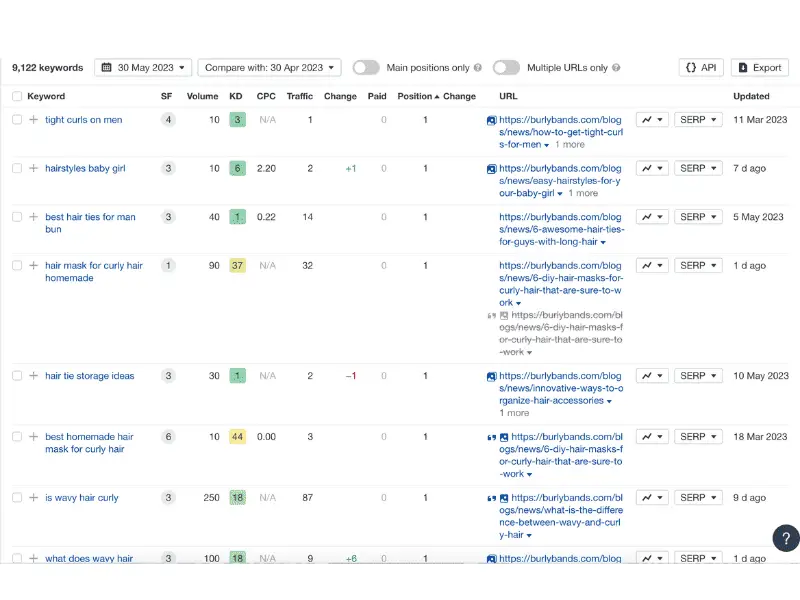
One common reason for a Google ranking drop is a change in search engine algorithms. When Google updates its algorithm, it often changes the way it evaluates and ranks websites. This can lead to fluctuations in your site’s search engine rankings, especially if you’ve been targeting the wrong keywords. To prevent a Google rankings drop due to algorithm changes, regularly update your keyword targeting to focus on those that are relevant to your content and your target audience.
On-site issues can also contribute to a Google rankings drop. Assessing your website’s content and technical aspects is crucial for identifying potential problems that could be affecting your search engine rankings. One common on-site issue is the overuse of keywords, also known as keyword stuffing. Google considers this practice as spammy, which can lead to your site being penalized or even removed from the index. To prevent this, always ensure that you’re using relevant keywords in a natural and useful way in your content.
Another critical factor to consider in keyword targeting is keyword cannibalization. This occurs when multiple pages on your website target the same keyword or similar keywords, causing them to compete against each other in search engine rankings. To prevent keyword cannibalization, develop a comprehensive keyword strategy that includes targeting variations of your primary keywords. This will help you to create a diverse and well-optimized content portfolio that aligns with your target audience’s interests.
It’s also important to remember that search engine algorithms are constantly evolving, and user search habits can change over time. As a result, keywords that were once highly relevant may no longer be as effective. To maintain your site’s search engine rankings, routinely analyze your keyword targeting and update it as needed to reflect current trends and user preferences.
To prevent a Google rankings drop and maintain a strong online presence, prioritize keyword research and targeting as an essential aspect of your site’s SEO strategy. Regularly assess your site’s content and technical aspects, and stay informed about algorithm changes that could impact your keyword targeting. Aim to create comprehensive and diverse content that uses relevant keywords naturally, and always keep an eye on current trends and user preferences. By doing so, you’ll be setting your website up for success in the competitive world of search engine rankings.
4. Off-site Factors: The Influence of External Elements on Your Site’s Search Engine Performance
When it comes to your site’s search engine performance, off-site factors can play a significant role in determining its ranking. Search engines like Google consider numerous external elements when evaluating a website, so it’s essential to understand how they may influence your site’s performance. This way, you’ll be able to identify and address the issues that can contribute to Google’s rankings drop.
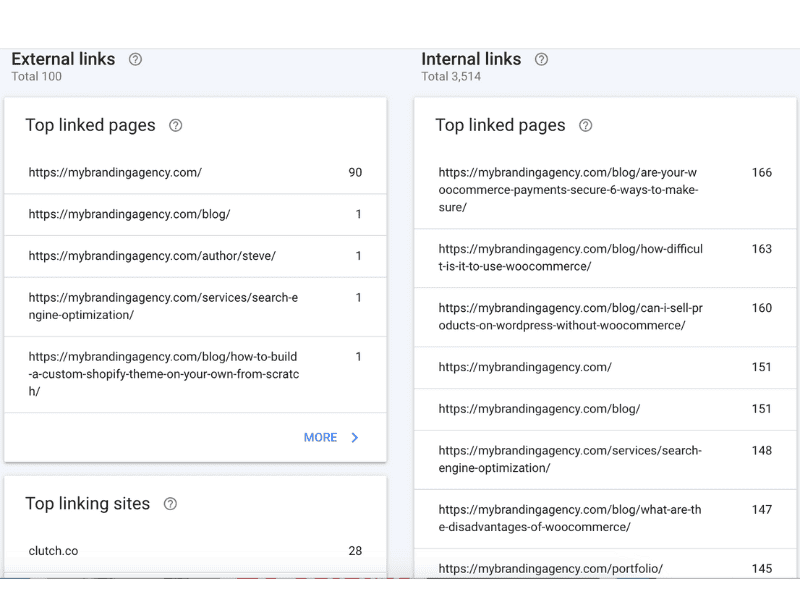
Firstly, let’s discuss the importance of backlinks in your site’s search engine rankings. These are links from other sites directing users to your website, and they serve as strong indicators of your site’s credibility and popularity. High-quality, relevant backlinks can significantly boost your site’s search engine performance, while a decrease in these valuable links can lead to Google rankings dropping. To monitor your site’s backlink profile and identify any issues, utilize tools like Google Search Console or other SEO software.
Another off-site factor to take into account is social media presence. An active and engaged following on social media platforms can improve your site’s reputation and visibility, ultimately enhancing its search engine performance. Be sure to consistently post relevant and valuable content on your site’s social media channels to maintain a healthy online presence.
Online reviews and ratings are also external elements that can influence your site’s search engine rankings. A higher number of positive reviews and ratings can signal to search engines that your site is trustworthy and well-regarded, which can boost your site’s performance. So, encourage satisfied customers or clients to leave positive reviews on your site or third-party review sites to increase your site’s credibility.
The competition also plays a significant role in your site’s search engine performance. If your competitors are optimizing their sites and constantly improving their off-site factors, they might outrank your site and cause a drop in your rankings. To stay ahead of the game, regularly assess your competitors’ off-site factors and look for areas where you can make improvements to your site’s external elements.
Lastly, the anchor text of your site’s backlinks can have a substantial impact on its search engine performance. Search engines consider the keywords used in anchor text when determining a site’s relevance and authority on a specific topic. Consequently, having a diverse and informative anchor text profile can enhance your site’s search engine performance, while an imbalance or over-optimization of keywords can lead to Google rankings dropping.
Off-site factors play a crucial role in your site’s search engine performance. To prevent Google rankings drop, regularly monitor your site’s backlinks, social media presence, online reviews and ratings, and anchor text profile. Furthermore, stay informed of your competitors’ off-site strategies and improvements to ensure that your site remains competitive in the ever-evolving search engine landscape.
5. User Experience: How a Poorly Optimized Site Can Lead to Google Rankings Drops
It’s no secret that user experience plays a significant role in a site’s success on search engine rankings: as an online presence with a poorly optimized site can lead to Google rankings drops. In this competitive digital landscape, providing a seamless and engaging user experience is crucial to ensuring your site remains at the top of search engine results pages. This article will discuss how a poorly optimized site can have a negative impact on user experience, ultimately leading to rankings drops and a decrease in overall site performance.
First and foremost, let’s understand what we mean by a poorly optimized site. In terms of user experience, this refers to the overall ease of navigation, design, functionality, and accessibility of a website. A site that is difficult to navigate, slow to load, or full of technical issues will be deemed as having a poor user experience, likely resulting in a drop in search engine rankings.
When evaluating the user experience of a site, site owners can look out for various factors that may affect performance on search engine rankings. Key offenders include slow page load times, broken or dead links, and confusing navigation structures. Each of these issues contributes to a frustrating experience for users, leading them to abandon your site in favor of a competitor’s offering a more seamless browsing experience.
The connection between user experience and search engine performance is more critical than ever, as search engine algorithms continue to evolve and prioritize factors such as site quality and relevancy. As a result, ensuring that your site is fully optimized and free from technical issues is crucial for maintaining a strong online presence and preventing Google rankings drops.
Beyond the technical considerations, the content of a site plays a significant role in determining its user experience. Poorly organized or hard-to-read content can cause frustration and disappointment for users, leading to a diminished user experience and, subsequently, a drop in search engine rankings. Utilizing relevant keywords in your content is essential for both the optimization of your site and as a means of preventing a decline in Google rankings.
It’s not just on-site factors that can impact your site’s search engine performance; off-site factors also play a crucial role. In such a competitive digital landscape, understanding the influence of external elements on your site’s search engine performance is vital for staying ahead of the competition and maintaining strong rankings. This may include activities such as link building, social media marketing, and online reputation management.
When considering the reasons for a Google rankings drop, it’s essential to thoroughly evaluate both the on-site and off-site elements of your site. Bearing in mind the importance of user experience, as well as technical aspects such as site optimization and keyword targeting, will allow you to proactively address potential issues before they lead to a rankings drop. By tackling these challenges head-on and implementing strategic solutions, you can put your site in the best possible position to succeed on search engine rankings and stay ahead of the game.
6. Competitor Analysis: Identifying Competitor Changes That Affect Your Website’s Google Rankings
One critical aspect of maintaining your website’s search engine performance is conducting a thorough competitor analysis. By identifying competitor changes and understanding how they impact your site’s Google rankings, you can observe and adapt to the competitive landscape of your industry, allowing you to stay ahead of the game while avoiding any negative repercussions caused by such changes. In this section, we’ll discuss the importance of competitor analysis and how it can help you overcome issues that may lead to a drop in Google rankings.
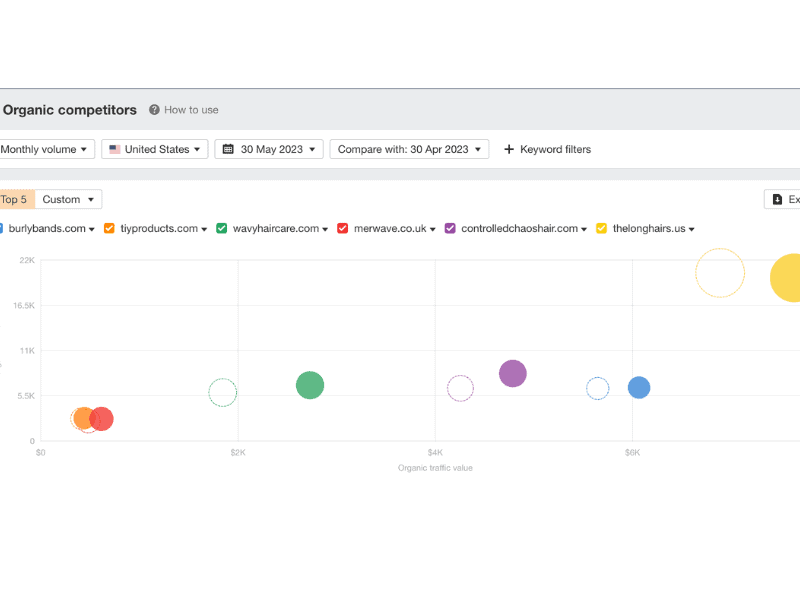
Performing a competitor analysis means evaluating the websites of your competitors to identify any changes or improvements they’ve made, which could be affecting your website’s search engine ranking. These competitor changes can come in various forms, such as content modifications, technical updates, or enhancements, as well as the implementation of new keywords or SEO strategies. Keeping an eye on your competitors’ actions allows you to react and modify your website, ensuring it stays relevant within the ever-evolving search landscape.
There are several factors affecting search engine rankings that can be influenced by competitor changes. For example, websites often compete for the same keywords in order to rank higher. If your competitors start using new or more relevant keywords, your website’s rankings may potentially suffer. To counter this, it’s important to regularly review and update your keyword targeting, ensuring you’re using comprehensively researched and relevant terms to your business, industry and target audience.
Another aspect to consider in a competitor analysis is their website’s technical performance. If your competitors make improvements to their website’s speed, crawlability or mobile-friendliness, this can lead to better search engine performance for them and, consequently, a drop in rankings for your website. Make sure to regularly assess and optimize your website’s technical aspects in order to stay competitive and maintain high Google rankings.
External factors, such as backlinks and social media presence, are also worth monitoring during competitor analysis. If your competitors start receiving high-quality backlinks or gain significant traction on social media, search engines may perceive them as more authoritative and relevant, leading to better search engine rankings. To address this, you should continuously work on acquiring high-quality backlinks and improving your website’s off-site presence.
Additionally, user experience plays a significant part in Google’s ranking algorithm. If your competitors make changes to their websites to improve user experiences, such as better site navigation, more engaging content, or faster loading times, this may lead to better user satisfaction and, ultimately, better search engine performance. Make sure to periodically review your website’s user experience and implement changes to ensure it remains competitive.
Conducting a competitor analysis is crucial in identifying competitor changes that may negatively impact your website’s Google rankings. By staying vigilant and adapting to your competitors’ actions, you can ensure your website never falls behind in terms of search engine performance. By focusing on keyword targeting, on-site and off-site factors, as well as user experience, you can effectively counter any changes made by your competitors and maintain or improve your website’s Google rankings.
7. Solutions for Recovering from a Google Ranking Drop: Strategies and Best Practices
When you’re dealing with a Google ranking drop, it’s crucial to have effective solutions for recovering your website’s search engine performance. In this article, we’ll discuss strategies and best practices to help you bounce back from a ranking drop and maintain or improve your Google ranking. Implementing these techniques will help you make the most of your search engine optimization and recovery efforts, so let’s dive in.
First things first, always stay up to date on Google’s algorithm changes. Regularly monitor and check for updates, as these can heavily impact your search engine rankings. When an update occurs, take the time to understand how it may affect your site’s performance and make any necessary adjustments. For instance, if a significant part of your content is deemed low-quality after an update, you may need to revamp your content strategy to boost your Google ranking.
Next up, evaluate your website’s on-site issues, such as broken links, duplicate content, and problematic coding. These technical aspects can all contribute to a ranking drop, so fixing them will help improve your overall search engine performance. Your website’s content should also be reviewed for relevance and quality. Ensure that your content is engaging, informative, and targets the appropriate keywords in order to prevent Google rankings drop.
Keyword targeting is crucial for maintaining a strong Google ranking. Make sure you’re using relevant, high-quality keywords to optimize your website and stay competitive in your industry. Avoid overusing keywords, and focus on semantic keywords to create cohesive content that appeals to both users and search engines. Expand your keyword research to target long-tail keywords, as these can help you rank higher for more precise search queries. By employing a solid keyword strategy, you can protect your website against ranking drops.
Off-site factors are just as important as on-site factors when optimizing your website. A strong backlink profile is critical, as it signals that your website is a valuable resource to others. To address a possible negative influence on your site’s search engine performance, audit your backlink profile, and remove or disavow any harmful links. Building new, high-quality backlinks can also help you recover from a Google ranking drop.
The user experience should always be considered in every aspect of your website’s design and optimization. A poorly optimized site can quickly lead to Google rankings drops. Ensure that your website is mobile-friendly, easily navigable, and visually appealing. This can help you retain users and achieve higher search engine rankings.
Lastly, perform a competitor analysis to compare your website’s performance against your competitors. Identifying the changes or improvements that affect your Google rankings can offer valuable insights into what you need to do to remain competitive. By closely monitoring and reacting to industry and competitor trends, you can safeguard your website against future ranking drops.
Recovering from a Google ranking drop requires a strategic and comprehensive approach. By implementing these best practices and solutions, you’ll be well on your way to restoring and improving your search engine performance.
Read my recent article, where I delve into the nitty-gritty of SEO hiring costs, providing valuable insights and guidance on how much it truly takes to hire someone for effective search engine optimization.
8. Monitoring Your Website Performance: A Proactive Approach to Avoiding Google Rankings Drops
There’s no denying that search engine rankings play a crucial role in the success of any site, and experiencing a Google ranking drop can lead to negative consequences for your site. To protect your search engine rankings and potentially prevent future rankings drops, monitoring your website performance is a proactive approach that can ultimately safeguard your site’s success. In this article, we’ll cover several strategies and tactics you can employ to stay on top of your site’s performance and avoid a detrimental Google rankings drop.
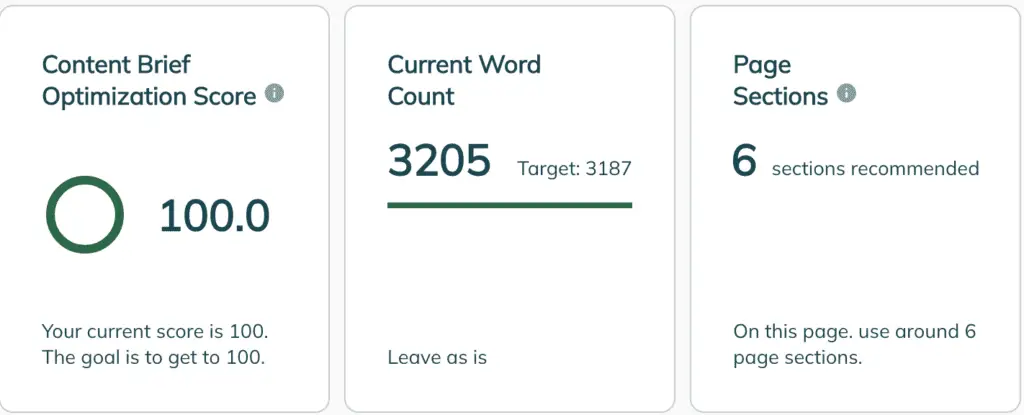
When it comes to monitoring your website performance, it’s essential to identify potential on-site and off-site issues that could result in a ranking drop. This includes evaluating the content and technical aspects of your site, such as keyword targeting and user experience, as well as exploring external elements like competitor analysis that could impact your search engine rankings. By keeping a close eye on these factors and making any necessary adjustments, you can take a proactive approach to maintaining and optimizing your site’s performance to avoid any unwanted Google rankings drops.
One of the key aspects of monitoring your website performance is staying informed about Google’s algorithm changes. As the search engine giant is constantly updating and refining its algorithms, it’s vital to be aware of these changes and how they may affect your site’s rankings. By staying informed and adapting your site’s content and technical aspects accordingly, you can minimize the risk of experiencing a rankings drop due to algorithm changes. This proactive approach can go a long way in ensuring your site remains resilient and relevant in the ever-evolving world of search engine rankings.
Another essential factor in monitoring your website performance is the process of keeping track of your relevant keywords and their usage. Implementing a solid keyword strategy can help prevent ranking drops by ensuring your site is targeting the right search terms that consumers are using. It’s important to regularly review and update your keyword list to stay ahead of the curve and maintain a competitive edge in search engine rankings. By continually evaluating and refining your keyword targeting, you’re taking a proactive approach to maintain and improving your site’s search engine visibility, thus avoiding Google rankings drops in the process.
Lastly, don’t underestimate the importance of addressing off-site factors that may impact your website’s overall search engine performance. Be sure to analyze competitor changes that could potentially be affecting your site’s rankings, and adjust your site’s content and strategies accordingly. Additionally, keep in mind that a poorly optimized site can lead to Google rankings drops, so always be diligent about improving your site’s user experience, engagement, and accessibility. In doing so, you’re taking a proactive approach to continuously optimizing and refining your site’s performance, which can help shield your site from the negative effects of a potential Google ranking drop.
Monitoring your website performance is a vital aspect of maintaining and enhancing your site’s search engine rankings, and a proactive approach can go a long way in avoiding Google rankings drops. By being vigilant about algorithm changes, on-site and off-site factors, keyword targeting, and user experience, you’re putting in the necessary effort to protect and optimize your site and ensure its continued success in the ever-competitive landscape of search engine rankings.


